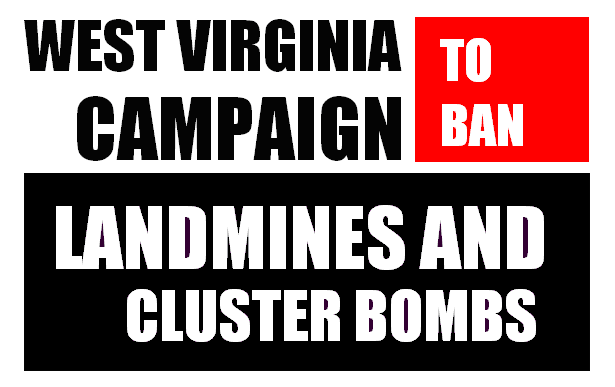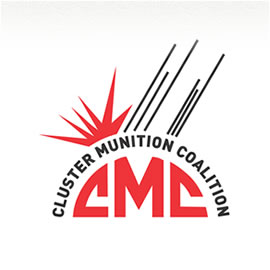The Fifth Meeting of States Parties to the Convention on Cluster Munitions (5MSP) will take place in San Jose, Costa Rica 2-5 September 2014. At this meeting, States Parties to the Convention on Cluster Munitions will give progress updates on implementing their treaty obligations and take key decisions on items including the structures to support the implementation and universalization of the Convention. States that have not yet joined the Convention will give updates on steps they are taking towards joining. The West Virginia Campaign to Ban Landmines and Cluster Bombs encourages the U.S. to attend the meeting and accede to the treaty banning cluster munitions.
August 1st 2014 – the Fourth anniversary of entry into force of the Convention on Cluster Munitions (CCM)
What are cluster bombs? Cluster bombs are large weapon systems containing multiple – often hundreds – of smaller bomblets. They can be dropped from the air or fired from the ground. Cluster bombs are also known as “cluster munitions” and the bomblets can also be called “submunitions”. It has been well established that cluster munitions have a devastating impact on the lives of civilians, both at the time of use and long afterwards. They are a problem for two reasons: 1) they are indiscriminate; 2) they are unreliable. Around the world, in every conflict in which they have been used, cluster bombs have caused excessive harm to civillians. During an attack, cluster bombs cover wide areas of land (up to the size of several football fields) with explosives and shrapnel. Cluster bombs are indiscriminate weapons, because they can’t distinguish between a soldier or a civilian. When cluster bombs are used in or near populated areas (the site of most modern conflicts) it is inevitable that civilian casualties, including women and children, are the result. What’s more, many of the submunitions, or bomblets, disbursed by cluster bombs fail to explode on impact. Due to this high failure rate, huge amounts of unexploded bomblets are left on the ground, after an attack. Like landmines, they pose a deadly threat to civilians living in that area long after a conflict has ended. Simply stepping on a bomblet or picking it up can cause it to explode – resulting in death or severe injuries from shrapnel, including loss of limbs and blindness. Cluster bomb contamination can make land unsafe to live on and cause economic insecurity. Farmers working their land may accidentally set off the bomblets. Tragically, children are often attracted by their small size, curious shape and color and mistake them for toys, killing or injuring themselves and others by picking them up and playing with them. Contamination can stop people from safely accessing schools, hospitals and land for housing and subsistence. Some communities have no choice but to carry on their daily lives on contaminated land, risking lives and limbs on a daily basis.

The global solution: The cluster bomb ban. The 2008 Convention on Cluster Munitions was established to put an end, for all time, to the suffering and casualties caused by cluster bombs. It comprehensively bans the use, production, stockpiling and transfer of cluster munitions. It requires destruction of stockpiled cluster munitions within eight years and clearance of contaminated land within 10 years of entry into force. It protects the rights of cluster bomb victims and it entitles countries affected by cluster bombs to receive international assistance to meet their legal obligations. In other words, the convention aims to prevent further harm from cluster munitions and to redress the impact of past use. One-hundred and thirteen countries have joined the ban, and many more adhere to it including stockpilers, former users and producers of the weapon as well as the majority of affected countries. As a result of its clear and time-bound requirements, states parties to the convention are working hard to destroy their stockpiles, clear their land and assist cluster bomb victims. Thanks to the ban, there is now a powerful stigma against cluster bombs. These weapons have been used in just a few countries in recent years. Each incident of use has been followed by strong international condemnation and often denial or regret by the state in question. But cluster bombs continue to kill and injure innocent people. THAT is why we feel it is essential for the strength of the ban that states join, no matter the size of the country, whether or not they are affected by the weapon, and whether or not they have used, produced or stockpiled cluster munitions. With every new country that joins the treaty, the global norm rejecting cluster bombs is strengthened and the protection for civilians is increased. Every country, INCLUDING THE U.S., can and should join the Convention on Cluster Munitions. And to accomplish that, we need you! Your voice is needed to speak up and tell governments they aren’t going to win a war or defend their country with a weapon that kills civilians. It is a question of political will and of prioritizing the protection of civilians over using outdated and indiscriminate weapons. The campaign to ban cluster bombs: Join us! The cluster bomb ban was achieved only because people from around the world demanded that it happened. And it will only be joined and enforced by all countries if individuals and groups around the world come together and demand it. The Cluster Munition Coalition is a global network of civil society groups, including WVCBL, working in some 100 countries to end the harm caused by cluster bombs. Launched in 2003, its founding members include Human Rights Watch, Handicap International, Norwegian People’s Aid and other leaders from the Nobel Peace Prize-winning International Campaign to Ban Landmines, which secured the 1997 Mine Ban Treaty. Following the signing of the Convention on Cluster Munitions by 94 countries in December 2008, the coalition mobilized a major global ratification campaign. Thirty countries ratified the ban swiftly, allowing it to enter into force in 2010. The coalition now works urgently for all states to join the ban and to fully implement all of its provisions. Countries will be encouraged to join – and implement – the cluster bomb ban when people from their own country, and like-minded others from around the world, convince them to do so. You can make the difference and stop the harm caused by these indiscriminate and outdated weapons. Please join us in our campaign to eradicate cluster bombs world-wide! Take action For more information on how you can help to stop cluster bombs in your country and around the world, go to www.stopclustermunitions.org


